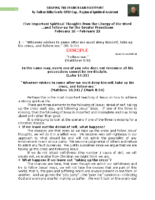Five Important Spiritual Thoughts from the Liturgy of the Word
…and follow up for the Secular Franciscan
February 16 – February 22
1 — “Whoever wishes to come after me must deny himself, take up his cross, and follow me.” (Mk 8:34)
DISCIPLE
(given to you before)
“Follow me.”
(Matthew 9:9)
In the same way, every one of you who does not
renounce all his possessions cannot be my disciple.(Luke 14:33)
“Whoever wishes to come after me must deny himself, take up his cross, and follow me.”
(Matthew 16:24) / (Mark 8:34)
Perhaps this is the most important
teaching of Jesus on how to achieve a strong spiritual life.There are three elements to the
following of Jesus: denial of self, taking up the cross each day, and following
Jesus’ steps. If one of the three is
missing, then the following of Jesus is imperfect and incomplete and may bring
about evil rather than good.It is intriguing to look at the
scenario if one of the three is missing for a Christian disciple.+ If we leave out the denial of self, what happens?
The chances are that even as we take up
the cross and follow Jesus’ thoughts, we will do it in a selfish way. We become very self-righteous in our approach
to what should be and will not admit the possibility of any involvement in evil
on our parts. We become judgmental of
others and refuse to admit any fault ourselves.
We justify ourselves since we argue that we are taking up the cross and
following Jesus.If we do not attack selfishness (the
number 1 cause of sin), we will create evil, no matter how Christian we might
think we are.+ What happens if we leave out “taking up the cross”?
The chances are here, that even though
we admit our selfishness and try to follow Jesus’ ways, we will not face the
crosses that are part of this world, that is, the pain and suffering which are
always present in one form or another.
And we go into the “pity party”—the “poor me” syndrome—criticizing God
and everyone else for making us suffer.
We won’t look on the every-day living as something that we must work at,
and accept the crosses which are there every day, and work with them.There was a great line in the true life
adventure of the movie “Apollo 13”. When
everything was going wrong, the Director of Operations, Gene Frantz said, we
have to “work the problem.” He took everything that the trapped
astronauts had in their capsule, threw them on a table in front of his
engineers, and said those words—work the problem—figure out from what you have,
exactly what they have to do. That is, “Do your Christian best with the
circumstances that you are given—what might be called the prime directive
of the spiritual life. (Television series: Star Trek)The person who is not accepting the
crosses of daily life are not “working the problems” of daily living.+ And, what if we leave out “following Jesus’ steps”?
Here, we have denied ourselves, and we
have taken up the crosses of every-day living, but we don’t have a guide.We will not consciously do this since
we are indeed Christians, but it is something that happens because of our busyness. We just don’t take the time that we
should. We don’t do the meditation; we
don’t do the spiritual reading that we should.Bishop Weisenburger a couple of years
ago in one of his writings said that we are spending the majority of our time
pursuing these five things, and therefore following them instead of following
the Lord:– busyness—we follow our work, play, the things that make up day-to-day living;
– materialism—we want more and more things even though we do not need them at all;
– revenge—we follow the thought of getting back at people;
– individualism—I follow what I want;
– entitlement—I want what I think I deserve in life.
Another problem in our Christian world
is ignorance. We don’t do the spiritual reading that we
should. We should be reading the
thoughts about spiritual development and Christian theology every day in one
form or another, and from every point of view, conservative as well as
progressive.The exaggeration of John the Evangelist
to close his Gospel is a great one to think about as we think of the reading
that we must do: “There are also many other things that Jesus
did, but if these were to be described individually, I do not think the whole
world would contain the books that would be written.”
2 – “It is good that we are here!” (Mk 9:5)
…In what areas can I be a little more positive in my thinking?
3 – “This is my beloved Son. Listen to him.” (Mk 9:7)
…Have I made the reading of the Gospels a significant part of every day?
4 – “Offer no resistance to one who is evil.” “Love your enemies and pray for those who persecute you.” (Mt 5:39, 44)
…As I think of the person(s) with whom I have the most trouble, how am I acting toward them?
5 – “They had been discussing among themselves on the way who was the greatest.” (Mk 9:33)
…Is pride one of my faults?

